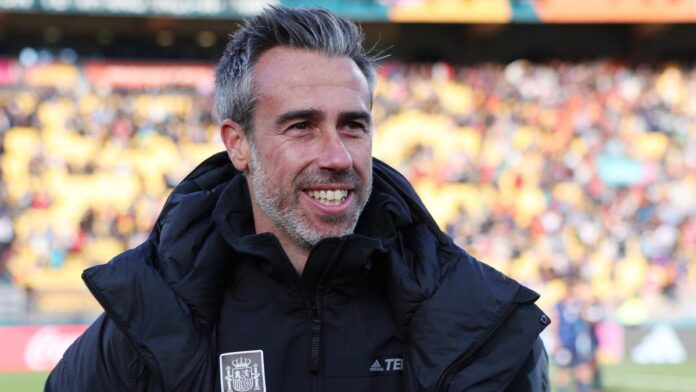Off the pitch, few teams at this Women’s World Cup have been as dysfunctional and wracked by controversy as Spain. Yet on the field, few have produced such impressive performances and possess such remarkable talent. Spain beat the Netherlands 2-1 after extra time in Wellington to reach their first Women’s World Cup semi-final, with teenager Salma Paralluelo scoring an extra-time winner. Manager Jorge Vilda’s coaching abilities and relationships with his best players have been the subject of fierce criticism. But having led his country to their best ever Women’s World Cup showing, he was able to take a celebratory tone and make light of matters such as the early morning kick-off times for audiences back in Spain. “First of all the semi-finals are at 10am – they do not have to get up early!” he said of the fans. “I know all the people who are watching, we have made them happy. It is a great day for Spanish women’s football.” Vilda’s position has been heavily scrutinised for some time, particularly since last September when the Spanish Football Federation (RFEF) claimed 15 members of its national team said they would resign if he did not step down. That was denied by the players but a stand-off ensued amid reports of concern over training methods and inadequate game preparation. ‘We continue to make the people happy who want the team to be happy’ Spain have set up a World Cup semi-final against Japan or Sweden Three of those players have since returned and are in the World Cup squad – they include Mariona Caldentey, who scored the opening goal of the last-eight tie with an 81st-minute penalty. Among those who have not returned are several star players for Champions League winners Barcelona, including midfielder Patri Guijarro, defender Mapi Leon, forward Claudia Pina and goalkeeper Sandra Panos. Vilda has always maintained the support of RFEF president Luis Rubiales, and thanked him by name following the quarter-final – while appearing to make a veiled reference to the scandal and the rebel players. “The federation and the president have always supported me from the very start,” he said. “All employees in women’s football are totally supported. “President Rubiales, he has been with me since the very first day, and over all of this year, which has been a very special year, let’s just say that. “Right now I am very happy, I think of all the management we have had to do, and obviously this is not over yet – we continue with a lot of willpower to make everyone happy, who is happy that the team has success.” Whatever problems Spain are having off the pitch, they are having unprecedented success on it. This is a country without Women’s World Cup pedigree, having only qualified for the first time in 2015, and which had never won a knock-out match at a major tournament before beating Switzerland in the last 16 to set up the meeting with the Netherlands. Not only is it the first time they have reached the World Cup last four, it is only the second time Spain have reached a semi-final after their first ever major tournament appearance at Euro 1997, which featured only eight teams. They have won four of their five matches at the 2023 Women’s World Cup after winning only one of seven matches during their first two appearances in the competition – one win, two draws and four defeats across 2015 and 2019. But as traditional giants like USA, Canada, Brazil and Germany have fallen, Spain have established themselves as a major world force. ‘We are among the world’s best’ Salma Paralluelo was dropped from the starting XI to face the Netherlands – but was brought off the bench and had the decisive impact “We have always dreamed of something like this,” said Vilda. “We are among the best teams in the world – but we are not stopping here. Today we want to celebrate, but tomorrow we start getting ready for the semi-finals.” Much of Spain’s success has been built on the rise of Barcelona, now perennial domestic queens and winners of two of the past three Champions League finals. Barca have produced key players throughout this Spain side, most notably Ballon d’Or winner Alexia Putellas, although she has yet to have a major impact on the tournament as she returns to fitness and started the quarter-final on the bench. Putellas burst into tears after the final whistle, overcome by the emotions of a historic victory – albeit one inspired by a new Barcelona and Spain star. Paralluelo only made her debut with the senior Spain team last November but it was a memorable one, with her scoring a hat-trick in a 7-0 win over Argentina in a friendly. She previously represented Spain in athletics at the European Indoor Championships in the 400m in 2019, before giving up sprinting to focus solely on football. Her winning goal was timed at 110:34 – the latest match-winning strike in Women’s World Cup history. And, at 19 years and 271 days, she is also the youngest player to score in extra time. Paralluelo is just the latest teenager to make a major mark at this World Cup. From Linda Caicedo lighting up Colombia’s historic run to Haiti’s Melchie Dumornay causing England all manner of problems, via Casey Phair of South Korea breaking the competition’s youngest player record , this has been a tournament for the younger generation. “Salma is a player with enormous potential and she’s not reached her best yet,” said Vilda. “She’s a very young player who has been training one year in football specifically, and the best of Salma we’ll see it in the future. “Now she’s excellent, but in the future it’s going to be much, much more.”


